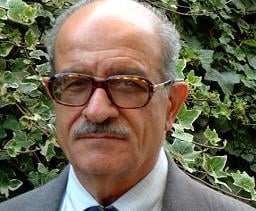One of the many criticisms of the Syrian government has been it’s Human Rights record. While the current regime is certainly more humane than that of the former president, questions remain regarding the abuse of citizens in a number of cases.

Prominent Syrian Human Rights Activist Haitham al-Maleh
One case that has hit the headlines recently has been that of Haitham al-Maleh, who recently spent his 80th birthday in a Syrian prison. Not exactly warm and cozy. Mr. Maleh has been an outspoken critic of the regime, in particular voicing opposition to the emergency law which has allowed the the government to jail whomever it wants. Mr. Maleh, for example, is being jailed for “weakening national morale”. Apparently opposition to the government is a really big bummer.
Mr. Maleh is not the only Syrian who finds himself in this position. Scores of outspoken lawyers, journalists, writers and other activists are also jailed for making public statements out of step with the government. The question becomes has the human rights situation actually improved? And what will the future hold as Syria attempts economic and diplomatic openings?
The goal of opening up the country economically and bringing about a new openness with the west while still holding onto old measures of repression, such as the emergency law, seems like an impossible mission. If the country is able to modernize the economy and forge new ties with old enemies, the political repression of the past would seem to be a natural casualty.
However, there are plenty of interests within the national power structure that like the system as it is. One of the defining characteristics of the governmental structure set up by Hafez Assad, and carried over by his son, is the distribution of power in many locations. While the President (both the former and the later) is undoubtedly the center of power and in control, there are many other centers of gravity that can influence outcomes. These multiple actors within the system can at times compete and often do not act in concert with national policies.
This is a long way of saying that while the President may be more open to the reform of certain legal protections, there would be much dissent within his government against doing something as drastic as rescinding the national emergency law. Since Bashar assumed power 10 years ago everyone has wondered just how much power he really holds, and how willing he is to take on an issue as troublesome as human rights.
While on a personal level the President seems amenable to such progressive causes, and there has been talk within pro-Bashar circles of his reformist tendencies, there has been little action to back up such words. In practice most Syrians still must be very careful when discussing certain topics, and other topics are not to be discussed at all. Any challenge or criticism aimed at the government is entirely off-limits, and public statements of this kind are grounds for arrest or worse.
The promotion of Human Rights across national borders can be tricky. It can be seen as meddling by the government in question, has often been used as a political tool, and usually is a more important issue to the offending nation than the international community. In the end it’s some one else who is suffering and it is unlikely than many would sacrifice anything of value, like greater Syrian diplomatic ties or Syrian assistance on international issues for example, in exchange for progress in the Human Rights arena. However, as Syria attempts to gain momentum in it’s efforts to modernize in other areas the government will be forced to modernize it’s legal structures and the way it treats it’s citizens.